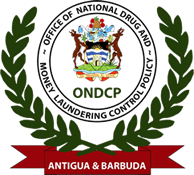
GOVERNMENT OF ANTIGUA & BARBUDA
June 8 2020
MEDIA RELEASE
The Supervisory Authority (ONDCP) Wins Appeal at the Privy Council
St. John’s, Antigua – 8TH June 2020. The Privy Council today dismissed the appeal of Ahmed Williams challenging the constitutionality of the civil forfeiture regime under the Money Laundering (Prevention) Act and the civil forfeiture order forfeiting his property to the Director of the ONDCP in his capacity as the Supervisory Authority.
On 10th September 2015, the High Court of Justice granted a forfeiture order against the Appellant Ahmed Williams. He appealed to the Court of Appeal on the basis that the forfeiture regime was unconstitutional and infringed on several of his constitutional rights. The Eastern Caribbean Court of Appeal dismissed the appeal on 13th July 2017.
The Director of the ONDCP, Lt. Col Edward Croft commented on the Privy Council’s decision, saying: “The Office of the National Drug and Money Laundering Control Policy is pleased with the decision to dismiss the appeal in this matter. The ruling buttresses the ONDCP in its mission to ‘take the profit out of crime’. It is our mission to ensure that criminals do not benefit from and enjoy the proceeds of their illegal activities. The legal framework provided by the Money Laundering Prevention Act has now been shown to be an effective piece of legislation and capable of achieving this objective.” The Director also expressed satisfaction with the Privy Council’s assessment that the MLPA freezing and forfeiture regime did not breach section 3 of Antigua and Barbuda’s Constitution, which concerns the right to possession of property. The forfeiture regime under the MLPA was found to be procedurally fair and the provisions of the MLPA were NOT found to be immeasurable, arbitrary or oppressive.” Sections 7, 9 and 15 of the Constitution were also found NOT to be breached.
The Privy Council stated about the Money Laundering Prevention Act that “It has been enacted with an important legitimate aim, to try to ensure that persons who engage in money laundering activity do not profit from it, and it is reasonable for the burden of proof to be placed on the defendant, who can be expected to know the source of his income and assets.”
The attached is a Press Summary produced by the Judicial Committee of the Privy Council. Read the summary here.
The complete judgement by the Judicial Committee of the Privy Council can be found at the following link:- https://www.jcpc.uk/cases/jcpc-2018-0041.html
END

